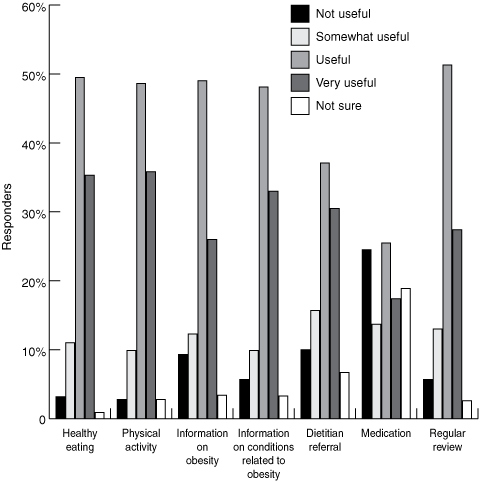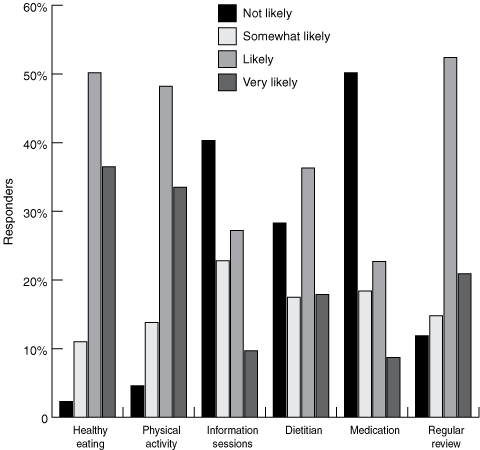Levels of overweight and obesity in Australia have risen to epidemic proportions over the past two decades.1,2 As general practitioners are consulted by over 80% of the Australian population during the course of a year,3 they can play an important role in weight management programs.4,5
Although there has been research on GPs’ attitudes to managing overweight and obesity in their patients,6-9 little is known about what weight management advice patients actually want from their GPs,10 and no research on this aspect has been conducted in Australia.
A total of 331 patients were approached. Of these, 295 patients were eligible to participate and 227 (76.9%) consented to take part in the study. The consent rate across the five practices ranged from 59% to 91%. The main reasons given for patients declining to take part were lack of time, lack of interest, or unable to read without spectacles. Some did not give a reason. There was no significant difference in the proportion of males and females among the responders and non-responders (P = 0.27). Demographic and anthropometric characteristics of the participants are given in Box 1.
Patient perceptions of the role of GPs in weight management are shown in Box 2. Most patients felt that GPs had a role in weight management and over half said they would see their GP for weight loss advice. However, a quarter said they would not. The reasons included:
Of the 227 patients, 71 (31%) felt they needed to lose weight and their GP had advised them to do so. However, another 75 patients (33%) who felt they needed to lose weight had not been advised by their GP to do so. We analysed the results of patient reports of GPs’ weight-loss advice according to measured BMI (Box 1). Five of 63 patients in the normal weight range reported that they had been advised by their GP to lose weight. Of 67 patients in the overweight category, 14 had been advised by their GP to lose weight, but 53 had not; and of 81 patients in the obese category, 53 had received GP advice to lose weight, but 28 had not.
Patients’ perceptions of the usefulness of different strategies for weight loss provided by GPs are shown in Box 3A, and their perceptions of their likelihood of changing their behaviour in response to a GP’s advice on weight loss are given in Box 3B.
information on obesity would be “very useful” (39.6% v 18.5%; difference in proportion: 21.1%; 95% CI, 7.4%–35.4%);
information about medical conditions associated with weight would be “very useful” (47.6% v 24.6%; difference in proportion: 23.0%; 95% CI, 8.8%–37.0%); and
they were “very likely” to increase their physical activity (50.0% v 25.7%; difference in proportion: 24.3%; 95% CI, 10.0%–38.3%).
Most of the patients surveyed believed that GPs have a role in weight management and the necessary knowledge and skills, but only 46% felt that GPs had enough time to provide effective weight loss advice. Surveys of GPs have shown that they hold similar sentiments regarding lack of time in managing weight problems in their patients.6,11,12
Patients expressed positive views about receiving lifestyle advice, such as dietary and physical activity guides from their GP. These options were favoured over medications and dietitian referral. There is evidence that nutritional counselling can produce improvement in weight.13 The results are encouraging for the effectiveness of strategies like the SNAP (smoking, nutrition, alcohol, and physical activity) framework14 and the Lifescripts resources.5
A survey of Australian GPs’ attitudes and practices regarding obesity management found that GPs viewed long-term follow-up as less likely to be important than the provision of advice about diet and physical activity.6 In contrast, in our study, patients felt regular review was a useful component of weight-loss management. Obesity is a chronic condition and long-term support from health professionals is recommended in managing this problem.2
Patients were ambivalent about the usefulness of medications for weight loss, and half of them stated they would be unlikely to take medication to lose weight. Studies of GPs have also shown reluctance to prescribe medications for weight loss to obese patients,7,15 and that only a minority of GPs thought medication for weight loss was useful.6
There were significant differences between normal weight and overweight and obese patients in their perception of the usefulness of information on weight and weight-related medical conditions, as well as their willingness to change their lifestyle. This may reflect greater resistance to a behaviour change among those who are overweight or obese, consistent with the findings of a study from the United States.16 Further research to identify reasons for resistance to behaviour change in this group is needed.
A limitation of the study is that it involved only a small number of practices and may not reflect the views of all patients. The study also had limited power to detect small differences between normal-weight patients and overweight or obese patients. The assumption was that for any outcome of interest reported by the normal weight group the study had 80% power to only detect a difference greater than 21%, with the attendant risk of type 2 errors. In our study population, overweight and obesity levels were higher than estimated population levels17 and levels in other general practice surveys.18
In summary, most of the patients surveyed felt that GPs have a role to play in weight management and would favour advice on lifestyle changes for weight loss over other interventions. They felt regular review would be useful, and they would be willing to attend for follow-up care. Better understanding of what patients want from their GPs will help contribute to improved management and care for patients.
1 Patients’ demographic characteristics and anthropometric measurements (data are given as number [%] unless otherwise indicated) (n = 227)
* Ten women and one man declined to be measured or were missed. † Risk of metabolic complications.2 |
|||||||||||||||
- Daisy Tan1
- Nicholas A Zwar1,2
- Sarah M Dennis1,2
- Sanjyot Vagholkar1,2
- 1 General Practice Unit, Fairfield Hospital, Sydney South West Area Health Service, Sydney, NSW.
- 2 School of Public Health and Community Medicine, University of New South Wales, Sydney, NSW.
We would like to acknowledge the help and support of the doctors, staff and patients of all the practices that participated in our study. The practices were: Powell Street Medical Practice, Yagoona; Richmond Road Family Practice, Glendenning; Smithfield Surgery, Smithfield; Schwarz Family Practice, Elderslie; and Bowral Street Medical Practice, Bowral.
Conjoint Associate Professor Bin Jalaludin from the School of Public Health and Community Medicine, University of New South Wales, provided invaluable advice with the statistics.
The UNSW Primary Health Care Research Network (PHReNet) provided guidance and support.
The General Practice Education and Training (GPET)/General Practice Registrars Association (GPRA) Registrar Scholarship and Research Fund Grant provided financial assistance, but the study was conducted entirely independently.
None identified.
- 1. International Diabetes Institute. Diabesity and associated disorders in Australia, 2000: the Australian diabetes, obesity and lifestyle study (AusDiab). Melbourne: International Diabetes Institute, 2001.
- 2. National Health and Medical Research Council. Clinical practice guidelines for the management of overweight and obesity in adults. Canberra: NHMRC, 2003. Available at: http://www.health.gov.au/internet/wcms/publishing.nsf/Content/obesityguidelines-guidelines-adults.htm (accessed Jun 2006).
- 3. Commonwealth Department of Human Services and Health. Better health outcomes for Australians. National goals, targets and strategies for better health outcomes in the next century. Canberra: AGPS, 1994.
- 4. Wake MA, McCallum Z. Secondary prevention of overweight in primary school children: what place for general practice? Med J Aust 2004; 181: 82-84. <MJA full text>
- 5. National Heart Foundation of Australia and Kinect Australia for the Lifescripts consortium. Lifescripts in your division: supporting lifestyle risk factor management in general practice. A guide for Divisions of General Practice. Canberra: Commonwealth of Australia, 2005.
- 6. Campbell K, Engel H, Timperio A, et al. Obesity management: Australian general practitioners’ attitudes and practices. Obes Res 2000; 8: 459-466.
- 7. Foster GD, Wadden TA, Makris AP, et al. Primary care physicians’ attitudes about obesity and its treatment. Obes Res 2003; 11: 1168-1177.
- 8. Cade J, O’Connell S. Management of weight problems and obesity: knowledge, attitudes and current practice of general practitioners. Br J Gen Pract 1991; 41: 147-150.
- 9. Price JH, Desmond SM, Krol RA, et al. Family practice physicians’ beliefs, attitudes, and practices regarding obesity. Am J Prev Med 1987; 3: 339-345.
- 10. Potter MB, Vu J, Croughan-Minihane M. Weight management: what patients want from their primary care physicians. J Fam Pract 2001; 50: 513-518.
- 11. Pratt CA, Nosiri UI, Pratt CB. Michigan physicians’ perceptions of their role in managing obesity. Percept Mot Skills 1997; 84: 848-850.
- 12. Holund U, Thomassen A, Boysen G, et al. Importance of diet and sex in prevention of coronary artery disease, cancer, osteoporosis, and overweight or underweight: a study of attitudes and practices of Danish primary care physicians. Am J Clin Nutr 1997; 65 (6 Suppl): 2004S-2006S.
- 13. Pritchard DA, Hyndman J, Taba F. Nutritional counselling in general practice: a cost-effective analysis. J Epidemiol Community Health 1999; 53: 311-316.
- 14. Joint Advisory Group on General Practice and Population Health. Smoking, Nutrition, Alcohol and Physical activity (SNAP) framework for general practice: integrated approaches to supporting the management of behavioural risk factors of smoking, nutrition, alcohol, and physical activity in general practice. Canberra: General Practice Partnership Advisory Council, 2001.
- 15. Fogelman Y, Vinker S, Lachter J, et al. Managing obesity: a survey of attitudes and practices among Israeli primary care physicians. Int J Obes Relat Metab Disord 2002; 26: 1393-1397.
- 16. Murphree D. Patient attitudes toward physician treatment of obesity. J Fam Pract 1994; 38: 45-48.
- 17. Cameron AJ, Welborn TA, Zimmet PZ, et al. Overweight and obesity in Australia: the 1999-2000 Australian diabetes, obesity and lifestyle study. Med J Aust 2003; 178: 427-432. <MJA full text>
- 18. Britt H, Miller G, Knox S, et al. General practice activity in Australia 2003-4. Canberra: Australian Institute of Health and Welfare, 2004. (Cat. No. GEP 16.)







Abstract
Objective: To explore patients’ views of the role of general practitioners in weight management.
Design: Waiting-room questionnaire survey, including measurement of height, weight and waist circumference, May–August 2005.
Participants and setting: 227 patients from five general practices located in metropolitan and rural New South Wales.
Main outcome measures: Patients’ views on: the role of GPs in weight management; the usefulness of weight-loss strategies; and the likelihood of following the GP’s advice about weight loss.
Results: Most patients (78%) felt that GPs had a role in weight management, but only 46% thought that GPs would be able to spend enough time to provide effective weight loss advice. Over 80% of patients perceived advice on healthy eating and physical activity to be useful or very useful, and were likely to follow weight-loss recommendations; 78% were in favour of regular review. Patients indicated they would be less likely to see a dietitian or to attend information sessions, and unlikely to take weight-loss medication. Views of overweight and obese patients were generally similar to those of normal weight patients, but there were significant differences in perceptions of the usefulness of information on weight and weight-related medical conditions, as well as willingness to change lifestyle, possibly reflecting resistance to change among obese or overweight patients.
Conclusion: These findings have implications for the design of primary care interventions for managing obesity.